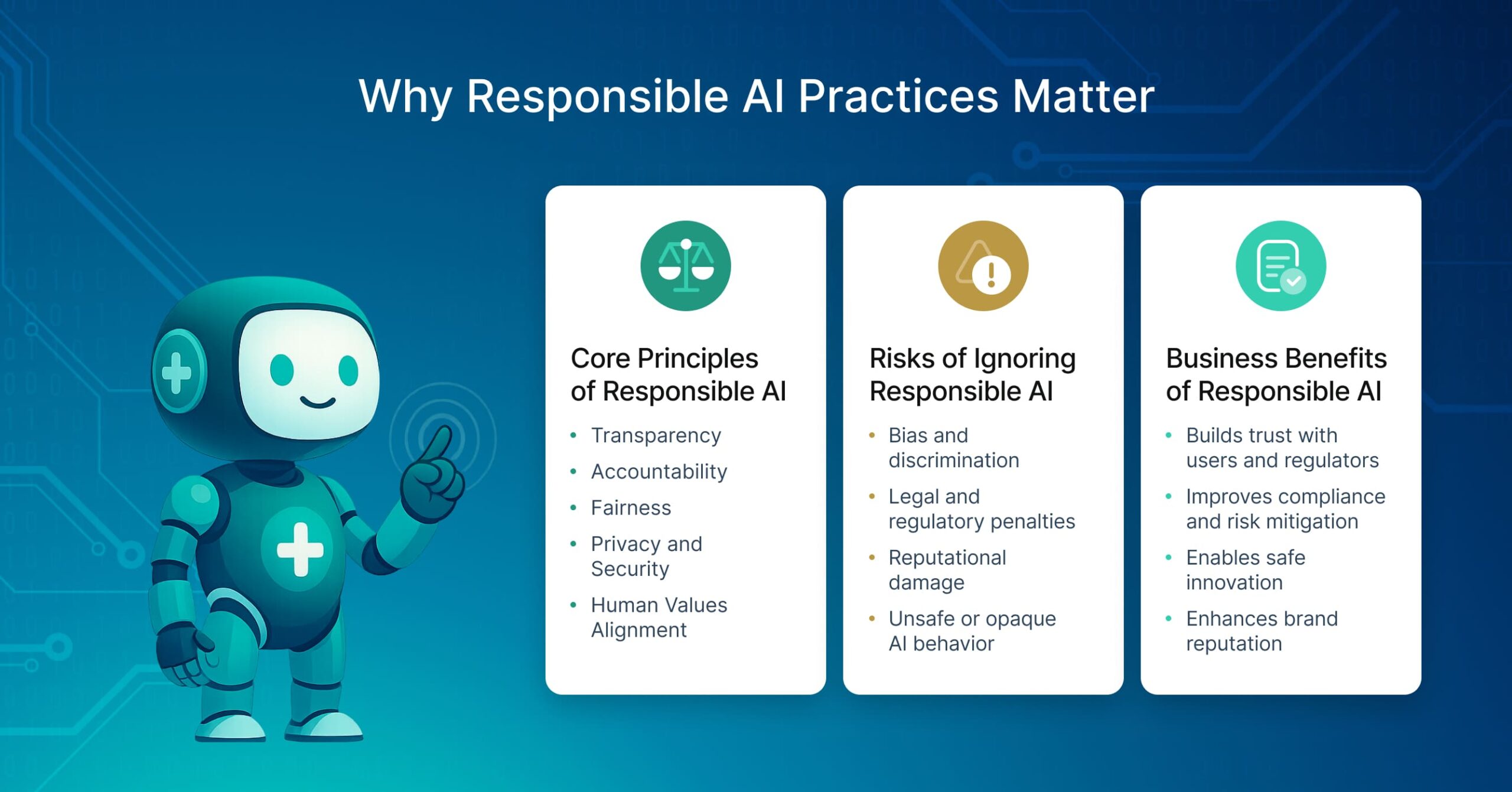Artificial intelligence is now woven into the fabric of modern enterprises. From predictive analytics to generative AI tools, organizations are leveraging these technologies to streamline operations, personalize services, and make better decisions. But with power comes responsibility. The rise of AI has sparked urgent questions about fairness, transparency, accountability, and trust. For organizations looking to scale AI effectively, embracing responsible AI practices isn’t optional—it’s a strategic imperative.
This article explores why responsible AI matters to organizations, the risks of neglecting it, and the transformative business benefits of adopting ethical, transparent, and accountable AI frameworks. We also offer a roadmap for leaders ready to embed responsibility at the core of their AI strategies. These principles are especially critical in the context of generative ai governance, where fast-evolving technologies require equally agile and ethical oversight.
What Is Responsible AI?
Responsible AI refers to the design, development, and deployment of artificial intelligence systems that are ethical, transparent, and aligned with human values. It is grounded in core principles such as:
- Transparency: Ensuring AI decisions are explainable and understandable to stakeholders.
- Accountability: Defining clear responsibilities for the outcomes of AI systems.
- Fairness: Avoiding biases that lead to unfair treatment of individuals or groups.
- Privacy and Security: Protecting sensitive data and complying with legal frameworks.
- Alignment with Human Values: Ensuring AI systems operate in ways that enhance human well-being.
At its heart, responsible AI ensures that technology serves society rather than undermining trust or perpetuating harm. Organizations adopting these principles create trustworthy AI systems that are better equipped to meet the expectations of regulators, customers, and employees.
Why Responsible AI Matters to Organizations

The stakes for responsible AI are higher than ever. Organizations are under increasing scrutiny from regulators, media, and the public. Failing to implement ethical AI practices can lead to reputational damage, legal penalties, and loss of customer trust. But beyond risk mitigation, responsible AI is a driver of long-term success.
Responsible AI builds organizational trust by ensuring systems are fair and explainable. In regulated industries such as healthcare and finance, it supports compliance with stringent laws, reducing exposure to lawsuits and fines. It also creates a foundation for ethical innovation, allowing organizations to explore AI opportunities without fear of unintended harm.
Adopting responsible AI also supports sustainability goals and aligns with environmental, social, and governance (ESG) initiatives. It positions organizations as leaders in their sectors and strengthens stakeholder relationships across the board.
Risks of Ignoring Responsible AI Practices
The consequences of irresponsible AI are far-reaching. Poorly designed algorithms can amplify biases, discriminate against marginalized groups, or produce decisions that are opaque and unchallengeable. Recent real-world examples include:
- AI recruiting tools that penalized female candidates due to biased training data.
- Credit scoring algorithms that reinforced racial and socioeconomic inequities.
- Chatbots spreading misinformation and offensive content when deployed without safeguards.
These failures not only harm individuals but also expose organizations to AI compliance failures, regulatory sanctions, and costly litigation. Perhaps most damaging, they erode public confidence in AI technologies and the companies behind them.
Business Benefits of Responsible AI Implementation
Responsible AI isn’t just about avoiding harm—it’s about unlocking value. Organizations that embrace ethical AI implementation often see improvements in decision quality, innovation speed, and brand reputation.
Trustworthy AI systems encourage adoption by employees and customers alike. When people trust the outputs of AI tools, they are more likely to engage with them and use them effectively. Responsible practices also support AI for competitive advantage, as organizations are able to deploy systems confidently in new markets without fear of regulatory backlash.
Moreover, responsible AI fosters a culture of innovation. Teams are empowered to experiment with new AI solutions because clear governance frameworks provide guardrails that minimize risk.
Real-World Examples of Responsible AI in Action
Several organizations have demonstrated the tangible value of responsible AI:
- A global healthcare provider implemented an AI governance framework that reduced algorithmic bias in diagnostic tools by 30%, improving patient outcomes and regulatory compliance.
- A financial services company adopted transparent AI models for credit scoring, which increased customer satisfaction and reduced regulatory complaints by 25%.
Conversely, companies that neglected responsible AI have faced public backlash and financial penalties. These case studies underscore the importance of embedding ethical AI in practice from the start.
How Organizations Can Implement Responsible AI
Implementing responsible AI requires a deliberate, structured approach:
- Develop an AI Governance Framework: Establish policies and processes to oversee AI development and use.
- Conduct Regular AI Audits: Evaluate systems for bias, fairness, and compliance.
- Foster Cross-Functional Collaboration: Engage legal, technical, and business teams to ensure diverse perspectives in AI oversight.
- Provide Ethical AI Training: Equip employees with the knowledge to design and deploy AI responsibly.
- Start Small and Scale: Pilot governance practices in high-risk areas before rolling out enterprise-wide.
The Pacific AI Policy Suite offers ready-made templates that align with over 100+ AI laws and ethical standards worldwide. This suite allows organizations to embed responsible AI practices quickly and adapt to evolving regulatory landscapes.
Moving from Principles to Practice
Responsible AI is no longer a theoretical ideal—it is a practical necessity. For organizations seeking to lead with innovation and integrity, responsible AI practices form the foundation of trust, compliance, and long-term growth.
Pacific AI provides the expertise and tools to help you operationalize these principles. Download our AI Policy Suite to get started with pre-built governance templates, or book a consultation to design a strategy tailored to your organization.
By taking proactive steps now, your organization can build AI systems that inspire confidence and deliver sustainable value in an increasingly AI-driven world.
FAQ
What are the financial risks of ignoring responsible AI practices?
Non-compliance can lead to substantial fines—especially under regulations like the EU AI Act, where penalties can reach up to €35 million or 7% of global turnover—as well as amplified operational costs, legal fees, and long-term reputational damage.
How can irresponsible AI practices unintentionally reinforce
societal inequalities? AI systems may embed and perpetuate biases present in training data, leading to outcomes that favor certain groups and entrench social disparities in areas like hiring, healthcare, or justice without intentional misuse.
Why does responsible AI help build trust with users and stakeholders?
Ethical AI—implemented with fairness, transparency, and accountability—instills confidence among customers and other stakeholders. Transparent policies and safeguards increase trust and strengthen an organization’s social license to operate.
What competitive advantages come from adopting responsible AI practices?
Companies that integrate responsible AI principles are seen as more trustworthy, differentiating themselves by aligning with customer values, enabling better procurement wins, and supporting sustainable, long-term growth.
How does responsible AI support innovation while managing risks?
By embedding structured risk assessment, ongoing evaluation, and governance into AI workflows, organizations can confidently innovate—balancing speed with oversight, ensuring safer deployments, and aligning with evolving regulations.


